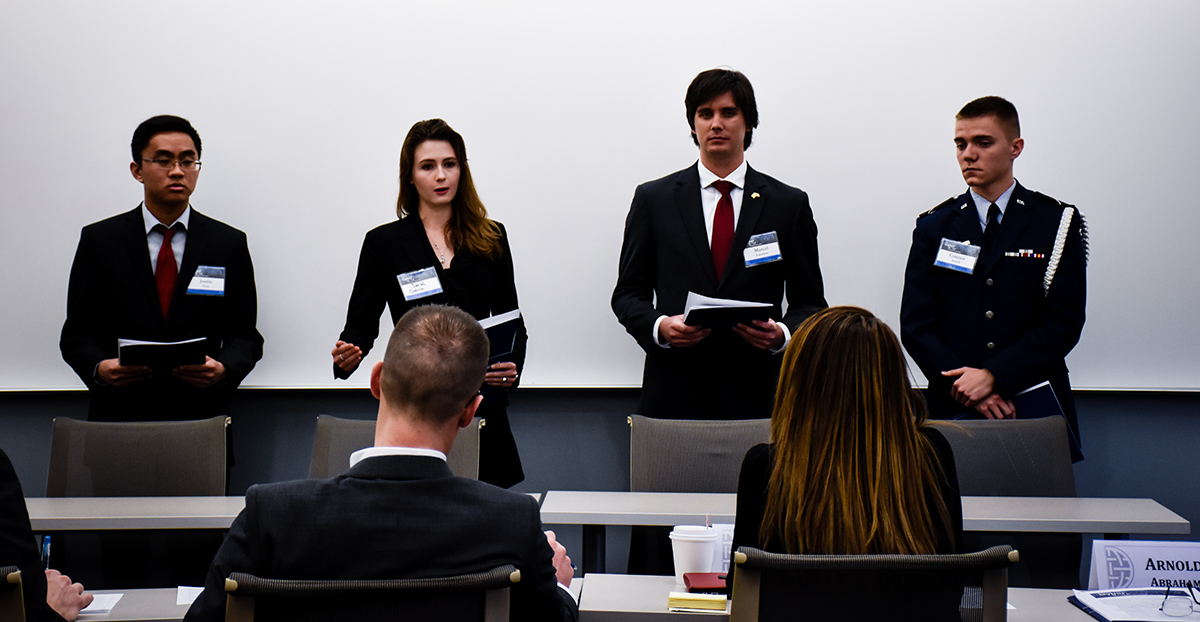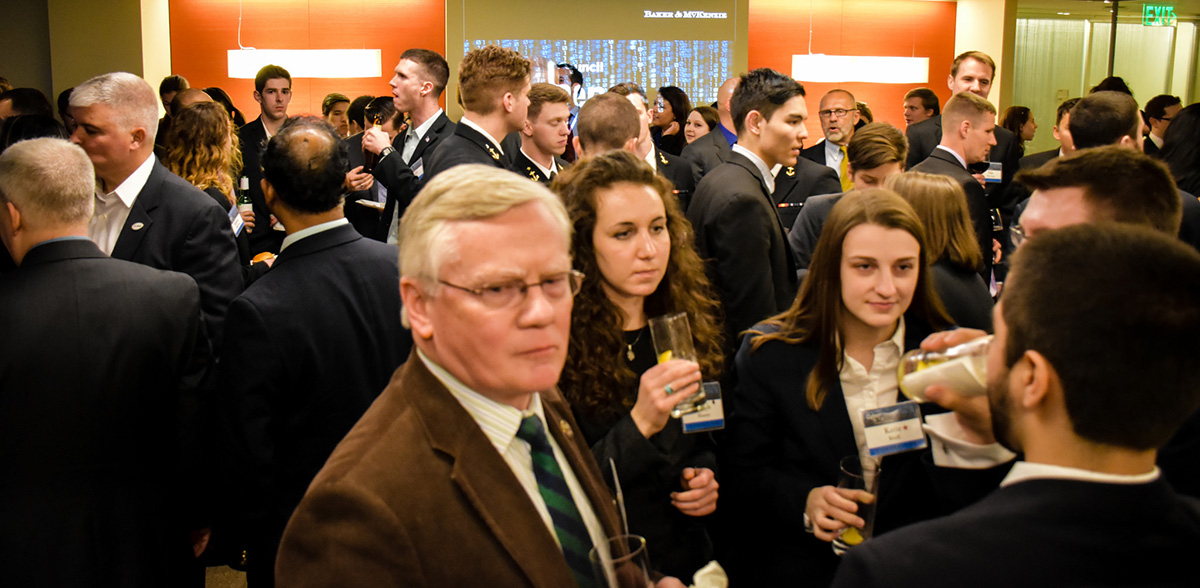ASU students sought for national cybersecurity competition

The ASU team of Marcel Lambert, Justin Tran, Sarah Galvin and Connor Smith at the 2016 Cyber 9/12 Student Challenge.
It's a student challenge based on a real-world scenario: A crippling cyberattack has hit the United States. You and your team must develop a response that includes identifying potential damage to public and private sector interests. You must come up with a plan to deal with possible public backlash and consequences to international diplomacy. And you must adapt your response in real time as new information becomes available.
Think you're up to the task? ASU is looking for students to compete in a qualifyng round to advance to the 2017 Cyber 9/12 Student Challenge in Washington, D.C. this spring. The deadline to apply is Dec. 15.
"Cybersecurity is our most critical policy challenge in the 21st Century,” said retired U.S. Army Col. Bruce Pagel, a professor of practice in the College of Public Service and Community Solutions in downtown Phoenix. “It profoundly impacts national security, personal privacy, the media, and the global economy.”
Last year's competition drew 40 teams from 25 universities. Justin Tran, Sarah Galvin, Marcel Lambert, and Connor Smith represented ASU.
"The world is changing and rapidly becoming more digital," said Justin Tran, a political science major. "I believe the Atlantic Council's Cyber Challenge is one of the best ways to prepare young students for the future we will live in and protect American lives and interests as we move further and further into the 21st century."
Tran heard about the competition from a class he was taking but wasn't sure it was for him. Then, a classmate who competed the previous year convinced him how significant this opportunity was.

Justin Tran, Sarah Galvin, Marcel Lambert and Connor Smith represented Arizona State University in the 2016 Cyber 9/12 Student Challenge in Washington, D.C.
"The Cyber 9/12 Student Challenge was an absolutely incredible experience for me," Sarah Galvin said. "As an undergraduate engineering student working to adopt a concurrent degree in political science I cannot imagine a better opportunity to interact with people who are driving the effort to ensure American cybersecurity and defense."
The competition tasks students with responding to the security, political and economic problems caused by an evolving state-sponsored cyberattack scenario. They are required to write a policy brief, present their findings to a panel of judges and answer questions from judges.
"Cyber 9/12 provides a unique opportunity for students to go deep into the intersection of cyber policy and technology, and test their thinking and writing skills against those of their peers — skills that will undoubtably help them succeed in the workplace," said Pagel, who coaches the ASU team.
The 2016 competition was based on a scenario in which a US defense contractor's computer systerms were hacked. Highly sensitive data was compromised including possible control of GPS satellites. The cyberattack meant that communication with figher jets and commercial aircraft were at risk as was cellular phone communication. In the commotion, nuclear-armed rivals India and Pakistan are brought to the brink of war after one country shoots down a commercial aircraft of the other that strayed into its airspace.
Tran said having a basic understanding of foreign affairs is preferable for the challenge. The one quality that will benefit students the most, Tran said, is enthusiasm.
"I truly think that anyone who is passionate and willing to put in time and effort into researching issues is capable of competing and doing well," Tran said.
The ASU team that competed in the 2016 competition presented a comprehensive policy response that addressed the multifaceted nature of cyber threats. Team members recommended a course of action that included security measures, diplomacy and public outreach. The plan sought cooperation from both the public and private sectors.
The ASU team's policy and technical experience were recognized by several judges to be among the most impressive of all the teams present. ASU was one of only two public universities to make it to the semifinal round.
"By all accounts, our team exceeded even our own expectations and performed well under pressure," Tran said. "I could not be prouder of our accomplishments and achievements."
The competition is sponsored by the Atlantic Council, a Washington, D.C. based think tank that focuses on political, economic and security issues affecting the Americas, Europe and Asia. The Cyber 9/12 Student Challenge is named for what policymakers would do the day after a crisis such as 9/11. The event offers students the chance to meet and learn from respected leaders on security issues in the public and private sector in Washington, D.C. This year's event featured live hacking demonstrations and panel discussions that focused on careers.

The Cyber 9/12 Student Challenge allows students to network with competitors, judges and experts from the public and private sector.
“The Cyber 9/12 Student Challenge provides a valuable opportunity to network with highly regarded cyber experts in both the academic community and the private sector, including access to cyber career information and discussions with potential employers," Pagel said. "The luncheon speakers, sidebar panel discussions, along with the competition itself, all provide an enriching and not-to-be missed student experience."
Justin Tran wants to enter next year's competition, but a heavy class load for the spring semester may prevent him from registering. For other students wondering whether to sign up, Tran says the experience is worth it.
"This competition was a truly enriching experience and a rare opportunity to not only learn from leaders in their fields but to network and challenge ourselves in the most intellectually stimulating manner possible," Tran said.
The cyber challenge is open to students currently enrolled in an undergraduate, graduate, doctoral, professional, or law program. No specific major, coursework or experience in cyber conflict is necessary, but successful applicants usually have a strong link between cyber conflict policy and their current academic interest.
Teams will be made up of four students, but consideration may be given to teams of three people. A qualifying round will be held to determine who will represent ASU at the Washington, D.C. competition. Students who are interested in competing in the 2017 Cyber 9/12 Challenge have until Thursday, Dec. 15 to apply. More information is available here.
The Atlantic Council Cyber 9/12 Student Challenge
More Law, journalism and politics

How ASU is leading the national conversation on journalism and AI
As artificial intelligence continues to advance at a rapid pace, journalism faces both unprecedented opportunity and profound…

5 takeaways about artificial intelligence and elections
Next year’s midterm elections are happening at a crucial time in the adoption of AI, with concerns that the new technology could…

ASU dominates Rocky Mountain Emmys, showcasing range of talent
Arizona State University stole the spotlight at the Rocky Mountain Southwest Emmys, walking away with an impressive haul of shiny…